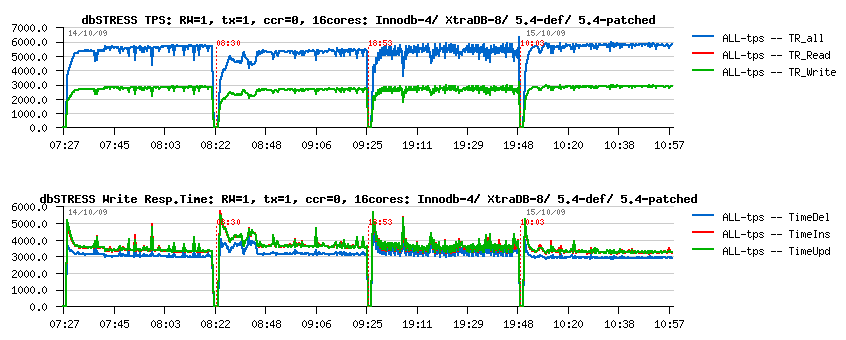« Performance Trainings & Conferences in Kiev | Main | MySQL Performance: Conference Session @Paris »
Friday, 16 October, 2009
MySQL Performance: Current performance levels of 5.4, XtraDB-8 and Innodb-1.0.4 @dbSTRESS
This is a short post just to make a point on the current performance level of available InnoDB engine implementations. I've made the current testing not in the goal to isolate performance issues, but to see how well the code works now when it meets the business constrain to flush on every transaction!..
The problem is that I've tested recently Oracle 10g with dbSTRESS during several customer's demands and was curious how well MySQL competes now with Oracle :-)) Due Oracle license restrictions I cannot present any Oracle results here (sorry folks, I still need my job :-)) But I've put MySQL into the similar conditions and was curious to see what is the current performance level we may expect on the same platform..
Until now I've always used "innodb_flush_log_at_trx_commit = 2" setting as I expected to isolate internal bottlenecks rather my storage array - but now it'll be "innodb_flush_log_at_trx_commit = 1". Bin log is not used (let's suppose we have a very secure storage array :-))
Setting innodb_flush_log_at_trx_commit = 1 changing a lot of thing - the workload become fully I/O-bound! - all will depends now how fast redo log is able to flush to disk!
dbSTRESS Scenario :
- 32 user sessions
- Read+Write workload (RW=1), no think time
- Read transaction contains 2 selects
- Write transaction contains 3 independent auto-commint orders: DELETE, INSERT, UPDATE
- Database contains 10M objects, 200M history records
- Test duration: 1 hour
H/W configuration :
- M5000 splitted in 2 zones: each zone attached to 16 own CPU cores, one zone runs MySQL, another dbSTRESS
- Storage array: ST6140 - splitted into 2 RAID1 LUNs, one keeps /DATA, another /LOG, cache on controller helps a lot!
MySQL configuration :
[mysqld] table_open_cache = 8000
# files innodb_file_per_table innodb_log_group_home_dir=/LOG innodb_log_file_size=1024M innodb_log_files_in_group = 3
# buffers innodb_buffer_pool_size=12000M innodb_additional_mem_pool_size=20M innodb_log_buffer_size=8M
# tune innodb_checksums=0 innodb_doublewrite=0 innodb_support_xa=0 innodb_thread_concurrency = 0 innodb_flush_log_at_trx_commit=1 innodb_flush_method= O_DIRECT innodb_max_dirty_pages_pct=40
# perf special innodb_adaptive_checkpoint / innodb_adaptive_flushing = 1 innodb_read_io_threads = 16 innodb_write_io_threads = 16 innodb_io_capacity = 2000
Notes:
- On XtraDB you have to disable innodb_adaptive_flushing to be able to use innodb_adaptive_checkpoint
- The innodb_thread_concurrency is set to zero as the current thread concurrency model is not taking care if thread is doing an I/O operation or not (see InnoDB concurrency models for more details)..
Results
the same test was executed for:
- InnoDB-plugin-1.0.4 (Innodb-4 on the graph
- XtraDB-8
- MySQL 5.4 default (5.4-def)
- MySQL 5.4 patched (5.4-patched)

Observations:
- Of course we are far here from previously observed 12.000 TPS :-) now we're flushing on each commit!
- INSERT and UPDATE response times are making the difference
- Surprisingly recently announced XtraDB-8 was performed slower rather InnoDB-plugin-1.0.4 - I think there should be something probably missed within the current code (specially when you discovering all new features prepared by Percona! :-)), but well, the gap is small, but present..
- MySQL 5.4 default version performs slower too, and even if it jumps to the higher TPS number it's lacking of stability..
- MySQL 5.4-patched - is the default version with separated purge thread patch applied (see the full report for more details) - it performs better than InnoDB-plugin-1.0.4 as well demonstrating a very stable performance due separated and non-blocking purge activity.
I think there are the last results with these versions, but I'll keep them as the reference for next new coming changes :-)
Any comments are welcome! :-)
(but, please, don't ask me about Oracle
results :-))
UPDATE: due several code revisions and tarball uploads of XtraDB sources on the Percona site, it seems I did not test the latest XtraDB-8 code and this explains observed performance difference (see my comments below in discussion with Yasufumi).. More results to come.